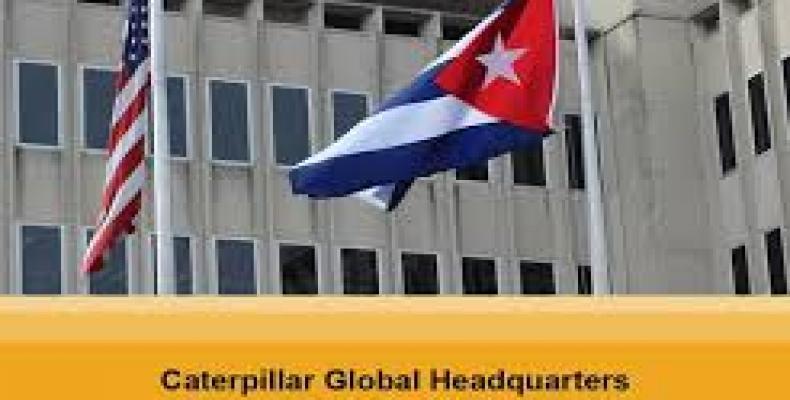Chicago, August 1 (RHC)-- Soon after Cuba's foreign minister raised the national flag outside the newly opened embassy in Washington last month, construction equipment giant Caterpillar did the same outside its Peoria headquarters, according to a story published by The Chicago Tribune.
Caterpillar is one of a growing number of Illinois and Chicago-area companies, civic organizations and cultural institutions rushing into a nationwide race to establish a foothold in the small island 90 miles off the Florida shore.
"Just about everybody focuses on the tens of thousands of 60-year-old cars that are on the streets, but for Caterpillar, we focus on the 60-year-old roads they are being driven on. That's where we see our opportunity," said Bill Lane, the company's director of global government affairs.
In Illinois, farms and food companies, medical device outfits and construction firms are among those embarking on scouting missions.
Chicago businesses and investors "better learn, and we better learn fast, because others are looking," said local attorney Patrick Croke, who assists companies in entering Latin America. "I'm sure New York and Miami will be all over this."
Entering the Cuban market remains a daunting task, even for businesses with a presidential green light to proceed. Payment and shipping restrictions, for instance, put U.S. firms and farmers at a disadvantage to foreign rivals — a situation that has caused Illinois growers to lose most of their Cuba export business to Asia and Brazil over the past decade.
Many companies "want to push the envelope to see how far this administration is willing to go," said Janet Kim, head of the international trade practice at law firm Baker & McKenzie.
"Once you open Cuba, it becomes yet another entry point for South America — and South America is a huge market for the Midwest," said Theresa Mintle, president of the Chicagoland Chamber of Commerce.
At the moment, Cuba is a small and shrinking slice of business for Illinois, just $3 million in exports last year, mostly chicken parts. But observers see potential for significant growth and say the state has some competitive advantages.
Illinois has a small Cuban-American population but "has long been at the forefront of engagement," Aho said. "Since 2001, when food and agriculture products were authorized for export, Illinois farmers and farm exporters have been actively pursuing contracts in Cuba."
Former Illinois Governor George Ryan led a delegation of government, business and academic leaders there in 1999, the first sitting governor to visit since revolutionary leader Fidel Castro came to power in 1959.
Along with business consultant Paul Johnson, who heads a statewide group focused on building ties with Cuba, Ruban is working on several initiatives. Plans in the works include bringing in a Cuban delegation to discuss cross-border commerce at a Chicagoland Chamber of Commerce forum this fall; organizing an agriculture-oriented trade mission, potentially led by Lt. Gov. Evelyn Sanguinetti and U.S. Reps. Rodney Davis and Cheri Bustos in October; and crafting a telecommunications- and medical-focused trade mission in December.


